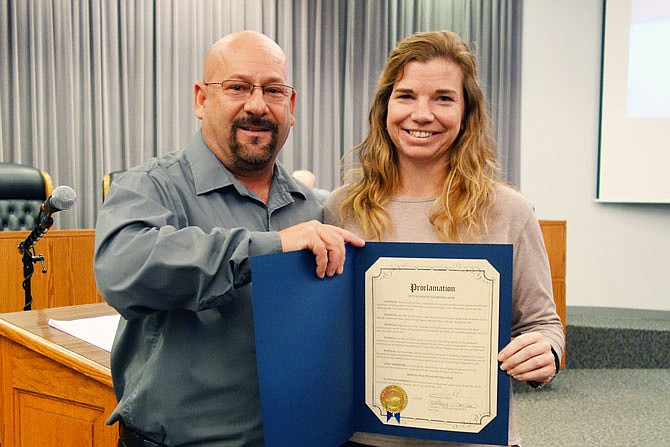When the Fulton Police Department encounters someone in the throes of a mental health crisis, they know exactly who to call.
Community Mental Health Liaison Laura Heitmann was recognized during Tuesday evening's Fulton City Council meeting. Mayor Lowe Cannell read a proclamation declaring this week Mental Health Awareness Week and praising Heitmann for her work in the community.
"They mentioned I had also received a state CMHL of the Year award, that happened in March. In August, I was awarded the (Crisis Intervention Team) International Behavioral Health Practitioner of the Year award, which I received in Seattle," Heitmann said. "But I have to say that this really touched me more than either of those awards, because this is my community. This is where I live, where I work, where my kids go to school. It's one thing for people on an international committee to recognize my work objectively, but it's another thing for people who I live and work among every day to do so."
Heitmann has partnered with the Fulton community for the last six years. She works for Arthur Center Community Health.
"The first time she came to my office, I thought she might be crazy, but she convinced me this was a thing we needed in Fulton," FPD Chief Steve Myers said. "There's instances where we police officers don't know what to do. She's just an angel for us."
With Heitmann's help, in 2014, the FPD became the first police department in Missouri to receive training from a CMHL.
"I completely made up the training, as I'd never trained law enforcement up to that point," Heitmann said. "I ended up having something like 70 officers I trained over course of two days."
Today, CMHLs assist law enforcement and courts across Missouri to direct people experiencing mental/behavioral health crises toward help to avoid unnecessary jail time and harm.
"A lot of times, the first responders to situations like that are law enforcement," Heitmann said. "In past, law enforcement got very little training, if any, in academy on how to handle these sorts of situations."
As a CMHL, Heitmann provides aid in six counties including Callaway County; Fulton is the largest city in that area.
Her day-to-day activities including things like training law enforcement officers in crisis intervention and suicide prevention techniques, finding open inpatient psychiatric beds for those who need them, collecting data about behavioral health issues and identifying and addressing barriers that reduce access to behavioral health services.
According to the Missouri Coalition for Community Behavior Healthcare, CMHLs regularly intervene in situations where the subject is suicidal, is dealing with psychosis or delusions, or presents a threat of harm to themselves or others. A majority of people referred to a CMHL are dealing with a mental health disorder such as depression, bipolar, schizoaffective disorder or substance abuse. Heitmann helps make sure those people know about help and treatment available to them.
"Only 50 percent of individuals with a serious form of mental illness seek treatment due to feelings of personal shame, fear of social stigma, discrimination and lack of support," Cannell said. "Stigma leads to fear and violence toward those suffering from mental illness, (while) greater public awareness can positively transform attitudes, access to service and support."
He commended Heitmann for the many hours of assistance she's provided in Fulton.
Events like Mental Health Awareness Week are important in decreasing the stigma around mental health issues, Heitmann said.
"It's a time when people can really look to your right, look to your left," she said. "You're going to see someone near you who's struggling with mental health or substance use concern. It doesn't discriminate. It touches everyone. And the way we talk about mental illness can sometimes prohibit people from accessing the services they need.
"When they encounter situations, they fill out a report called a CIT report, I go by police stations once a week, grab my reports and follow up with those people. Some may already be receiving behavior health services. I feel like everyone should have the opportunity to know what kind of help is available to them in their community."

